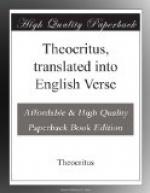To pluck the hyacinth-blossom on the fell,
Thou and my mother, piloted by me.
I saw thee, see thee still, from that day forth
For ever; but ’tis naught, ay naught, to thee.
I know, sweet maiden, why thou art so coy:
Shaggy and huge, a single eyebrow spans
From ear to ear my forehead, whence one eye
Gleams, and an o’erbroad nostril tops my lip.
Yet I, this monster, feed a thousand sheep
That yield me sweetest draughts at milking-tide:
In summer, autumn, or midwinter, still
Fails not my cheese; my milkpail aye o’erflows.
Then I can pipe as ne’er did Giant yet,
Singing our loves—ours, honey, thine and mine—
At dead of night: and hinds I rear eleven
(Each with her fawn) and bearcubs four, for thee.
Oh come to me—thou shalt not rue the day—
And let the mad seas beat against the shore!
’Twere sweet to haunt my cave the livelong night:
Laurel, and cypress tall, and ivy dun,
And vines of sumptuous fruitage, all are there:
And a cold spring that pine-clad AEtna flings
Down from, the white snow’s midst, a draught for gods!
Who would not change for this the ocean-waves?
“But thou
mislik’st my hair? Well, oaken logs
Are here, and embers yet aglow
with fire.
Burn (if thou wilt) my heart
out, and mine eye,
Mine only eye wherein is my
delight.
Oh why was I not born a finny
thing,
To float unto thy side and
kiss thy hand,
Denied thy lips—and
bring thee lilies white
And crimson-petalled poppies’
dainty bloom!
Nay—summer hath
his flowers and autumn his;
I could not bring all these
the selfsame day.
Lo, should some mariner hither
oar his road,
Sweet, he shall teach me straightway
how to swim,
That haply I may learn what
bliss ye find
In your sea-homes. O
Galatea, come
Forth from yon waves, and
coming forth forget
(As I do, sitting here) to
get thee home:
And feed my flocks and milk
them, nothing loth,
And pour the rennet in to
fix my cheese!
“The blame’s
my mother’s; she is false to me;
Spake thee ne’er yet
one sweet word for my sake,
Though day by day she sees
me pine and pine.
I’ll feign strange throbbings
in my head and feet
To anguish her—as
I am anguished now.”
O Cyclops, Cyclops,
where are flown thy wits?
Go plait rush-baskets, lop
the olive-boughs
To feed thy lambkins—’twere
the shrewder part.
Chase not the recreant, milk
the willing ewe:
The world hath Galateas fairer
yet.
“—Many
a fair damsel bids me sport with her
The livelong night, and smiles
if I give ear.
On land at least I still am
somebody.”
Thus did the Giant
feed his love on song,
And gained more ease than
may be bought with gold.




